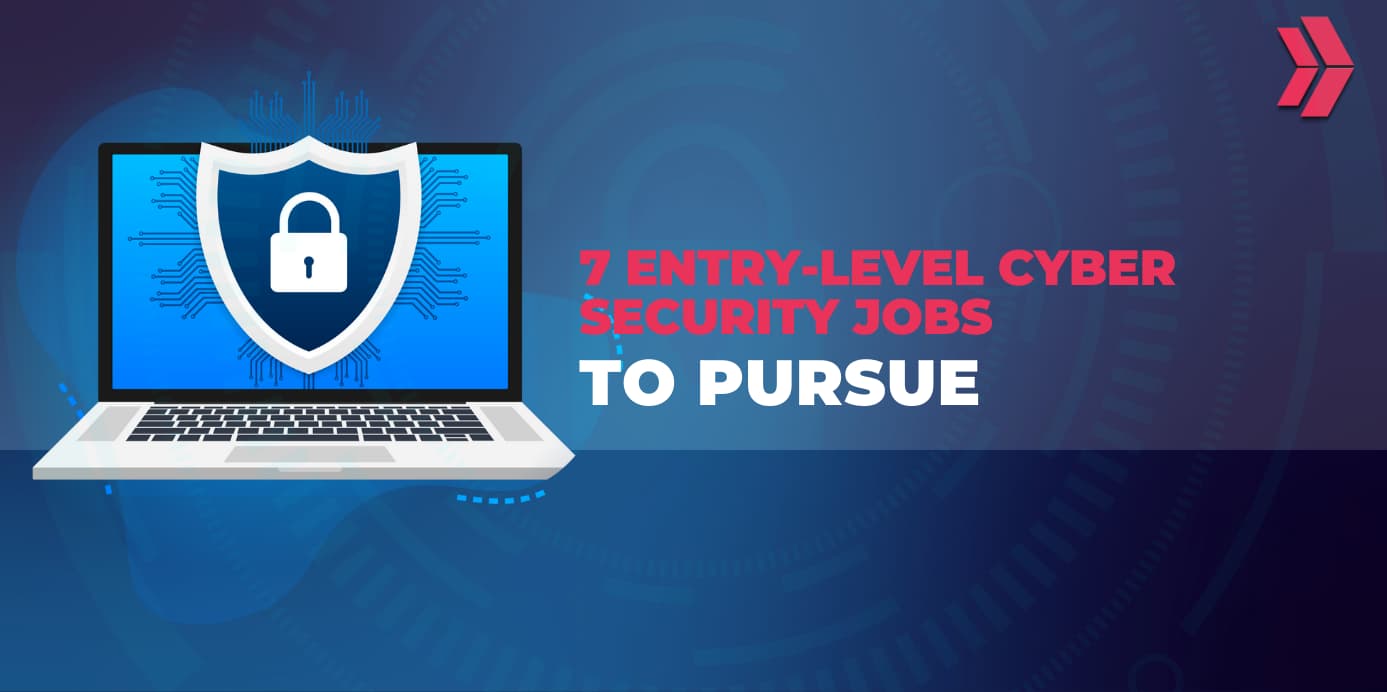Cloud Security Engineers bear the responsibility of devising, executing, and overseeing security protocols to safeguard the data, applications, and infrastructure within the cloud ecosystem. Cloud computing has completely transformed the IT sector, empowering companies to store and retrieve data and applications via the Internet. The significance of robust security measures has reached its pinnacle due to the extensive embrace of cloud services. Consequently, there is a high demand for individuals to explore the journey of becoming a cloud security engineer, acquire the necessary skills, and seize the abundant job prospects offered in this domain.
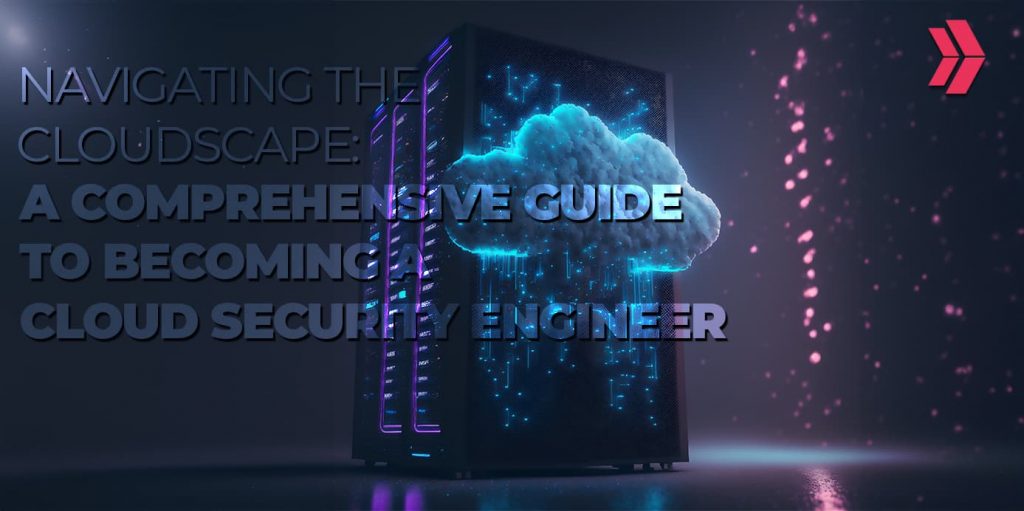
In this comprehensive guide to becoming a Cloud Security Engineer, we will delve into the realm of cloud computing and explore the critical role played by security professionals in safeguarding cloud environments.
What is Cloud Security?
Cloud security describes the discipline for protecting cloud-based digital assets from cyber threats. Cloud security encompasses a variety of strategies, best practices, and technologies to mitigate security risks such as service disruptions, data loss, security breaches, and unauthorized access. Cloud security standards are the set of goals to satisfy the business needs for the confidentiality, integrity, and availability of cloud computing.
What is Cloud Security Engineer?
A cloud security engineer is a professional who designs, implements, and manages security measures in the cloud environment. A cloud security engineer -also known as a cloud computing engineer, cloud software engineer, or simply cloud engineer– uses cloud security best practices to enhance the organization’s security posture.
How to Become a Cloud Security Engineer?
The path to becoming a cloud security engineer involves a combination of education and certification and experience.
Generally, the term cybersecurity analyst is confused with an engineer. An engineer is responsible for designing and implementing security measures in the cloud architecture, while an analyst monitors the system that an engineer created or configured.
Educational / Cloud Security Training
The career path for a cloud security engineer requires a solid foundation and knowledge in a cloud environment. There are two main options to excel in this field.
The first option is traditional education. A bachelor’s or master’s degree in IT, computer science, or related fields builds a strong background, and these cloud security engineer programs will be a springboard in a career.
Secondly, the cloud security engineer bootcamp is an alternative learning path to becoming a Cloud engineer. Cloud security engineer training provides job-focused education in a relatively shorter time and at less cost than a traditional four-year college education. Furthermore, cybersecurity bootcamps offer cloud security engineer professional development support.
In addition to the cloud security engineer course, Self-study is an option for information security in general. However, becoming a cloud security engineer requires extensive technical knowledge, and self-study is not practical to meet these requirements.
Cloud Security Certifications
There are many highly-qualified cybersecurity certifications available in the market. Here we will mention only four of these cloud security engineer certifications famous in the industry:
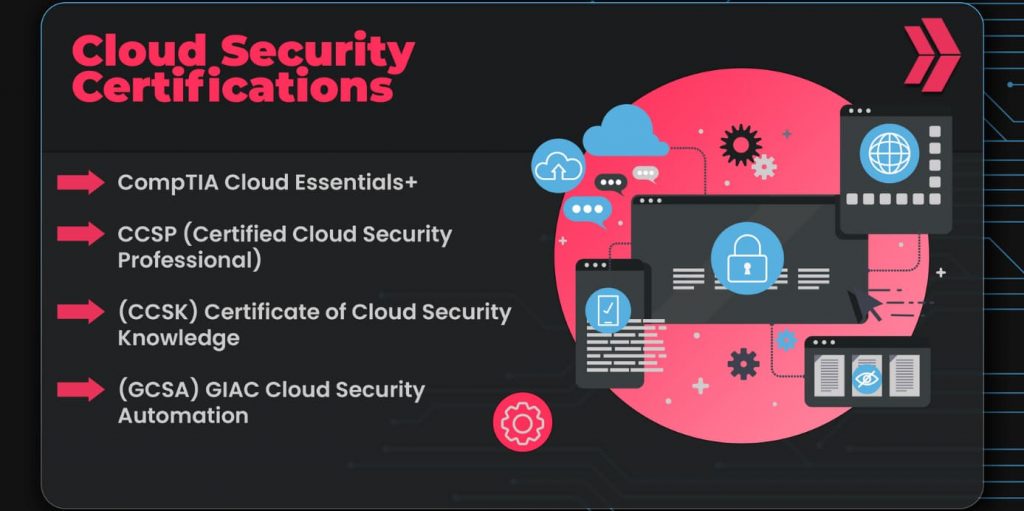
CompTIA Cloud Essentials+
CompTIA offers a Cloud Essentials+ certificate showing familiarity with fundamental cloud concepts, risk management, and response procedures for non-IT professionals. CompTIA Security+ gives basics before cloud knowledge. Also, Cloud+ is a good option for further development and to land cybersecurity jobs quickly.
Certified Cloud Security Professional (CCSP)
CCSP certificate, offered by (ISC)² and makes you globally recognized, validates the knowledge and skills in cloud security. Similarly, CISSP certification provided by the same vendor is an excellent combination to be successful in a cloud engineering career.
Certificate of Cloud Security Knowledge (CCSK)
The Cloud Security Alliance (CSA) offers a widely accepted CCSK certificate that focuses on cloud security best practices and principles. In addition, the Certificate of Cloud Auditing Knowledge (CCAK) is a perfect complementary certification for cloud security engineers for further enhancement provided by the same organization.
GIAC Cloud Security Automation (GCSA)
GIAC offers (GCSA) practitioner certification that validates sufficiency in Cloud services. This certification also credentials your DevSecOps practices in a Cloud environment. GCSA certification indicates your ability to apply theoretical knowledge in automated implementations.
Gaining Experience in the Field
A cloud security engineer should combine cloud security training and certification with experience to succeed. You may get hands-on experience in a lab environment based on real-world scenarios or prefer to get cloud security engineer jobs to work on real cloud projects. Gaining experience in applying theoretical knowledge is vital for a solid career to acquire best practices and build a strong portfolio.
Moreover, cloud security engineer work experience could show your strong sides or weak points to be improved. Working on cloud security projects enables you to simulate real challenges encountered in daily life, such as collaboration, implementation, and incident response processes.
An experience in cloud security engineering enhances your understanding of cloud security. By having seen many cases, you may better assess security risks and offer well-grounded solutions for mitigation. Also, staying updated deepens your knowledge and skills in the cloud environment.
Why is Cloud Security Important?
Cloud security is utilized in cloud environments to safeguard a company’s data against threats such as distributed denial of service (DDoS) attacks, malware, unauthorized access or usage by hackers or unauthorized users. According to Statistica, the global market for public cloud services is projected to witness a growth of around 21.7 percent in 2023, reaching approximately 597 billion U.S. dollars.
Cloud security is crucial as it enables you to amplify the protection of your digital assets while mitigating the perils linked to human error. This, in turn, minimizes the probability of your organization experiencing detrimental losses caused by preventable breaches.
Cloud computing has made a positive contribution to businesses and changed the way how they work efficiently. First, cloud security prevents cyber threats and provides a relatively secure environment. Moreover, secure cloud infrastructure offers easy troubleshooting processes and disaster recovery plans.
Cloud security governance is a cost-effective way to manage operations. Furthermore, cloud computing provides high availability and real-time support. Last but not least, cloud security ensures legal obligations to protect data privacy and comply with related regulations.
What are Cloud Security Engineer’s Job Opportunities?
Cloud security engineers may work in a variety of industries. Both government and private sector companies in technology, healthcare, finance, and many others badly need cloud security engineers.
Additionally, major Cloud Service Providers (CSP), such as Google Cloud Platform (GCP), Microsoft Azure, and Amazon Web Services (AWS), offer many job opportunities in different levels of cloud engineering.
Some enterprises may choose to have outsourced cybersecurity services, also known as Managed Security Service Providers (MSSPs), for cloud data protection. There is always a need for skilled professionals in cloud security management.
Moreover, cloud security engineers can provide consultancy services as a part of a consulting firm or as self-employed for secure cloud solutions. Additionally, they may participate in research projects to develop new tools or systems.
What Does a Cloud Security Engineer Do?
A cloud security engineer is indispensable in maintaining the security, integrity, and availability of cloud infrastructure and environment. Cloud security engineering is one of the most sought-after cybersecurity career paths.
What are the Daily Tasks of a Cloud Security Engineer?
Daily tasks of cloud security engineers are responsible for system monitoring, risk assessment, and incident response. They work closely with cross-functional teams to protect sensitive data and prevent unauthorized access, ensuring cloud-based resources’ confidentiality, integrity, and availability. Here, we will mention a daily routine of a cloud engineer.
System Monitoring
Cloud security engineers continuously monitor networks and systems to identify cyber threats. During the cloud security monitoring process, analyses and correlation of gathered data are paramount. Engineers utilize various technologies and tools to detect and mitigate potential offenses.
Risk Assessment
Cloud engineers proactively conduct vulnerability assessments within cloud environments to identify potential weaknesses. Solid risk analyses enable engineers to implement robust solutions to prevent cyber attacks. As a result of full cloud security risk assessment, engineers may effectively evaluate and guide on ways to improve overall security.
Incident Response
When a security breach or incident occurs, cloud security engineers are mainly responsible for performing incident response procedures. They scrutinize the incident intensely and work closely with other team members in mitigation, containment, and neutralization processes. As a part of post-incident activity, they prepare an incident report showing the breach’s impact.
What Skills Are Required for a Cloud Security Engineer?
A cloud security engineer’s skills cover both technical and soft skills to ensure secure cloud resources and implement cloud security policies.
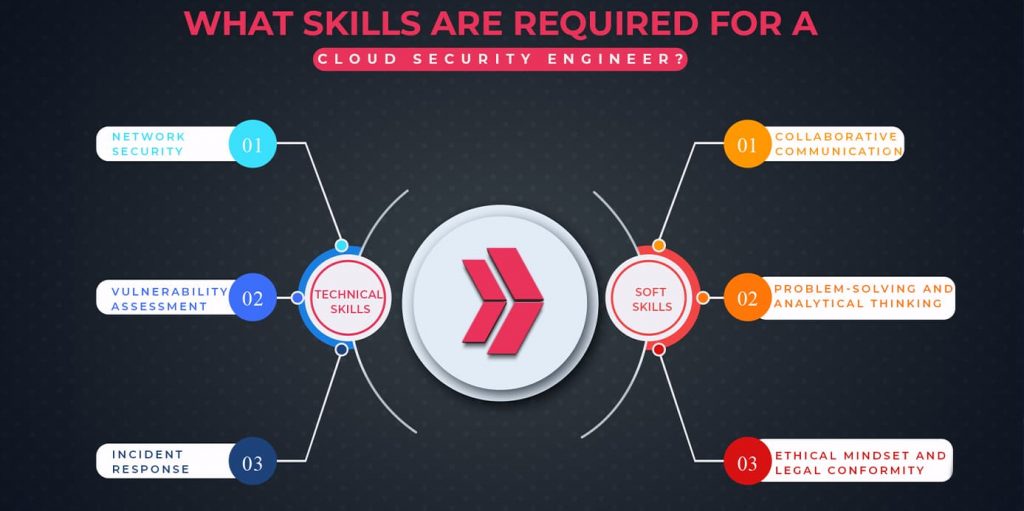
What are the Technical Skills of a Cloud Security Engineer?
To conduct daily activities, a cloud security engineer should have essential technical skills, such as network security, vulnerability assessment, and incident response.
Network Security
Cloud software engineers should have extensive knowledge of cloud security architecture, cloud security protocols, and principles. They need to monitor and analyze network traffic to identify and mitigate cyber-attacks. They should know how to segment and manage virtual networks.
Vulnerability Assessment
Engineers should know the tactics and techniques of threat offenders and how attackers think for a robust cloud security assessment in the first place. Cloud security engineers should be skillful in conducting penetration testing and vulnerability assessments to identify potential threats. To do so, they utilize assessment tools and use manual testing techniques. Finally, they provide recommendations for more robust security solutions.
Incident Response
Cloud security incident response is significant for detecting, investigating, and responding to cyber-attacks. In an incident, a quick response is vital to minimize the harmful effects and recover quickly. Well-planned incident response procedures and methodologies enable computer science professionals to conduct healthier forensic analyses and implement incident containment effectively.
What are the Soft Skills of a Cloud Security Engineer?
In addition to technical expertise, cloud security engineers should possess soft skills to work effectively. Here are some essential soft skills for a cloud security engineer:
Collaborative Communication
Cloud security engineer qualifications require strong verbal and written communication skills. Cloud engineers need the ability to articulate cybersecurity concepts to non-technical people. Moreover, reporting and documenting is one of the vital responsibilities of a cloud security engineer. Besides, collaborating with cross-functional teams is badly required for cloud engineers.
Problem-Solving and Analytical Thinking
Cloud security engineers should have strong critical thinking and analytical reasoning skills to identify, mitigate and troubleshoot cybersecurity issues. Engineers must develop practical and creative measures to preempt and prevent cyber attacks. A critical thinking mindset helps assess the security risks properly and recommend the best solutions to solve challenging problems.
Ethical Mindset and Legal Conformity
Cloud professionals must comply with legal obligations in the execution of daily routines. Cloud engineers should be committed to protecting data confidentiality and privacy. All actions must be accountable, and engineers must consider ethical considerations. Additionally, they should concentrate on meeting local and international cloud security compliance criteria.
Which Tools Are Used by Cloud Security Engineers?
Cloud security engineers use many paid and free tools to secure cloud environments. Here, we will mention the top 10 tools used in the market:
- CrowdStrike Falcon
- Qualys
- Splunk Enterprise Security
- CyberArk
- Zero spam
- ManageEngine Endpoint DLP Plus
- Orca Security
- Cloudflare Web Application Firewall
- Trend Micro Cloud One
- Centrify
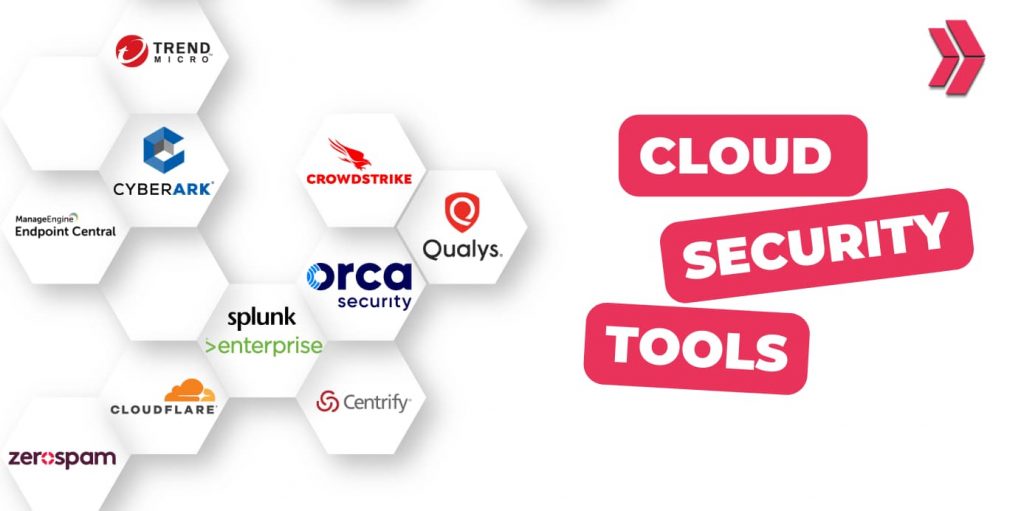
How much does a Cloud Security Engineer’s Salary?
Cloud security engineer’s salary is quite satisfactory. Many factors influence salary ranges, such as industry, location, experience, performance, and education.
As mentioned in the U.S. Bureau of Labor Statistics, the annual mean wage for all occupations in the U.S. is $61,900 in 2022. However, according to Salary.com, the average salary for a Cloud Security Engineer is $100,824 annually in 2023. The salary range is between $89,299 and $113,018 and is projected to increase.
Future of Cloud Security Engineering
The future of cloud security engineering is promising as more organizations migrate to the cloud, and the demand is likely to increase. According to Cyberseek, Cloud security is projected to grow 136% in the next five years. Also, cloud security engineer remote jobs make this career attractive.
The demand for skilled cloud security engineers with extensive knowledge and experience will continue to increase as the complexity of cyber threats grows. Engineers who keep themselves up-to-date with cloud security frameworks will be sought-after in the market.
AI technologies will integrate with automation, and cloud computing will gain importance. Consequently, the attack surface will expand, and cloud security engineers will play a pivotal role in securing the cloud.
Data privacy is of utmost importance. Cloud security engineers will improve Zero Trust Architecture and cloud security encryption and implement strict precautions to protect sensitive digital assets. Also, cloud security awareness training will be prominent in the future.
Conclusion
In conclusion, cloud computing has a broad attack surface in that attackers may exploit vulnerabilities. Cloud security engineer responsibilities are vital to keeping digital assets secure. So, Cloud security engineers are indispensable in designing, implementing, and managing security measures in the cloud environment. Cloud security engineering offers promising career options in various industries and positions. Now here is your chance to be a part of the future as a Cloud security engineer.
Frequently Asked Questions (FAQs)
What is the average salary of a Cloud Security Engineer?
The salary of a Cloud Security Engineer is $100,824 per year, according to Salary.com.
What are the top companies hiring Cloud Security Engineers?
Here is a list of the top 20 companies hiring cloud security engineers:
- Google Cloud Platform (GCP)
- Microsoft Azure
- Amazon Web Services (AWS)
- IBM Cloud
- Splunk
- Qualys
- Cisco Systems
- Fortinet
- Cloudflare
- McAfee
- Check Point Software Technologies
- Palo Alto Networks
- Okta
- Symantec Corporation
- Trend Micro
- FireEye
- VMware
- Proofpoint
- F5 Networks
- Akamai Technologies
Are there online courses for becoming a Cloud Security Engineer?
Yes. Many online courses provide job-oriented, flexible training to become a cloud security engineer.
What are the career growth prospects for a Cloud Security Engineer?
The demand for cloud security engineers will be on the rise. According to the Burningglass Institute report published in 2022, cloud security engineering is among the top five fastest-growing career paths.
Which are the most important certifications for a Cloud Security Engineer?
- CompTIA Cloud Essentials+
- Certified Cloud Security Professional (CCSP)
- Certificate of Cloud Security Knowledge (CCSK)
- GIAC Cloud Security Automation (GCSA)
How to transition from a traditional IT role to a Cloud Security role?
First, gain security expertise and a strong background in the cloud environment. Obtain relevant cybersecurity certifications and then get hands-on experience in cloud security implementations.
What are the challenges faced by a Cloud Security Engineer?
- Evolving threat landscape
- Misconfiguration issues
- Continuous monitoring and cloud security auditing
- Complex cloud security automation
- Collaboration hardships
What are the ethical considerations for a Cloud Security Engineer?
- Protection of data privacy
- Ensuring transparency
- Compliance with regulations and standards
- Fair treatment and non-discrimination
- Responsible disclosure


